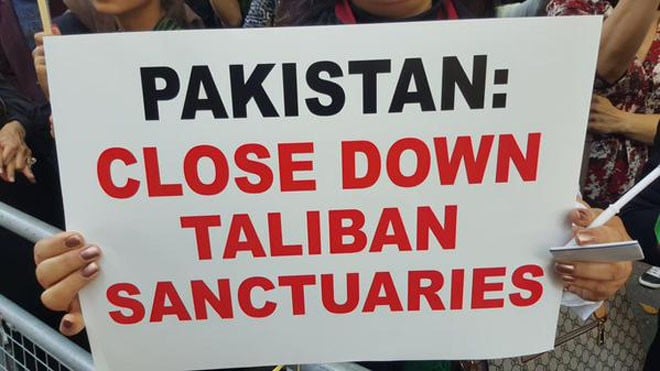
Reasons that have made Pakistan deeply unpopular in Afghanistan

One doesn’t remember when was the last time an anti-Afghanistan protest took place in Pakistan. It was, therefore, a rare sight that Pakistanis gathered outside the Peshawar Press Club on June 20 to stage protest against the Afghan government for the unprovoked firing at Pakistani forces at the Torkham border and demand the immediate expulsion of the more than 2.5 million Afghan refugees in Pakistan.
The protest was organised by various trade organisations, complaining that Afghan refugees were a burden on Pakistan’s economy and were involved in crime and acts of terrorism.
The protest wasn’t big but some of the slogans that were chanted or displayed on banners showed the anger the protestors felt against the government of President Ashraf Ghani. One slogan alleged that Afghan government was an agent of the Indian intelligence agency, RAW, another asked President Ghani to take the Afghan refugees to India, and yet another complained that Pakistanis served the Afghans for years by hosting and assisting them, but now the Afghan forces were firing and killing Pakistani soldiers.
Whether the one-off Peshawar protest was a reaction to the incidents at the Torkham border or an answer to the anti-Pakistan protests in Afghanistan, it paled in significance to the widespread demonstrations against Pakistan and the vitriolic propaganda blaming Islamabad, Pakistan army and the Inter-Services Intelligence (ISI), and the Punjabis for Afghanistan’s woes. Pakistan’s flags were publicly burnt and demands were made that Pakistan be listed as a sponsor of terrorism for harbourng those waging war in Afghanistan.
There was a surge in patriotic sentiment in Afghanistan as political and civil society activists showed solidarity with the Afghan forces battling the Pakistanis at Torkham. Abdur Rahim Ayubi, the member of the Wolesi Jirga (National Assembly) from Kandahar province, wore the uniform of the Afghan National Army to express solidarity with the troops. More than 1,000 mourners gathered in Jalalabad to attend the funeral of an Afghan soldier killed in the Torkham incident.
Read also: Once a refugee…
The Afghan government was urged to give a befitting reply to Pakistan. The Mesharano Jirga (Senate) chairman, Fazal Hadi Muslimyar, reminded Pakistan that it would meet the fate of Great Britain and the Soviet Union if it dared to attack Afghanistan.
In recent months, more so in the wake of big Taliban attacks in Kabul and elsewhere in Afghanistan, a campaign was launched to boycott Pakistani products and Afghan traders were advised after the Torkham border clashes to make alternative arrangements for their exports and imports, instead of using the uncertain overland routes through Pakistan.
President Ashraf Ghani accused Pakistan of waging an undeclared war against Afghanistan for the last 15 years while Masoom Stanekzai, who served as acting defence minister and is heading the Afghan intelligence agency, NDS, claimed Pakistan’s undeclared war had turned into a declared war against Afghanistan.
Not to be left behind, the office of Chief Executive Officer, Dr Abdullah, who is the de facto Prime Minister in the unity government, warned Islamabad that the Afghan forces with help from the international community would be forced to directly hit militants’ hideouts in Pakistan. Former Uzbek warlord, General Abdur Rasheed Dostum, presently the First Vice President, alleged without being able to provide any evidence that Pakistani military officers were leading the Taliban fighters in northern Afghanistan.
A number of Afghan Ulema issued a religious decree, telling the Afghan youth to wage ‘jehad’ against Pakistan and President Ashraf Ghani praised them for presenting a clear direction for coping with the situation. It was obvious the Afghan ruling elite had found Pakistan to be a convenient scapegoat to put all the blame on it for Afghanistan’s troubles. At times, the propaganda was unmistakably state-sponsored.
In comparison, there wasn’t any anti-Afghanistan campaign in Pakistan apart from the sole traders’ protest in Peshawar and occasional online messaging demanding tough action against the Afghan forces on the Torkham border after the killing of Major Al Jawad Changezi and sending back the Afghan refugees. Pakistan army chief General Raheel Sharif attended the funeral of Major Changezi, primarily to show the army’s profound grief and anger over his death and raise the morale of the soldiers.
However, there is no doubt that a host of reasons have made Pakistan deeply unpopular in Afghanistan. It was already accused of backing the Afghan Taliban and Haqqani network and hosting their leadership while the Torkham border clashes contributed to hatred for Pakistan. The new generation of Afghans hasn’t benefited from Pakistan’s hospitality for the Afghan refugees for the last 38 years and all they have seen and heard is the condemnation of Pakistan for destabilising Afghanistan in recent years.
Pakistan’s cause has also suffered from the deep inroads that its perennial foe, India, has made in Afghanistan through its more than $2 billion assistance to the war-ravaged country and its generous support for training Afghan army officers, cops, teachers, foreign ministry officials, and offering fully-funded scholarships to students.